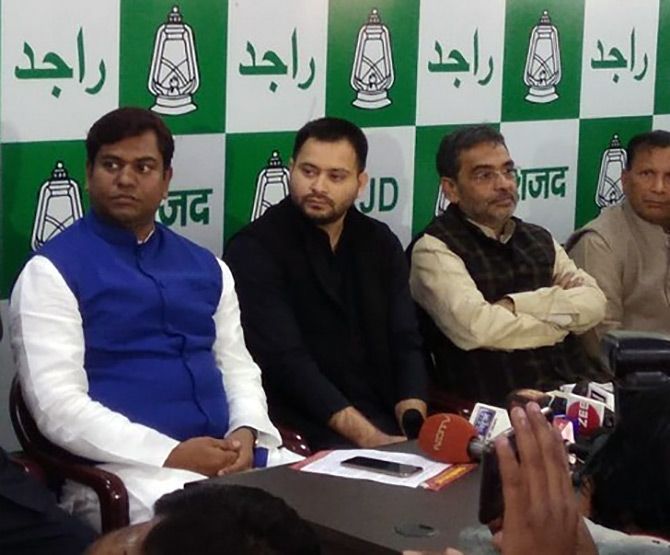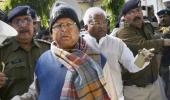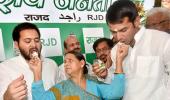'The Mallahs may remain divided between the two competing coalitions in Bihar,' says Mohammad Sajjad.

Recently, there have been efforts towards political organisation and assertion by the Mallahs (Hindu fishermen and boatmen) in Bihar, as well as in parts of neighbouring Uttar Pradesh.
Mukesh Sahni, a Mumbai-based film-maker, and a native of Darbhanga, formed a political outfit, the Vikas-sheel Insan Party -- VIP -- on November 4, 2018, and aligned it with the Rashtriya Janata Dal-led coalition.
This was months after Dr Sanjay Nishad formed the Nishad Party and his son Pravin Nishad contested a by-election from Gorakhpur, UP, state Chief Minister Ajay Singh Bisht's home turf.
With the Samajwadi Party and Bahujan Samaj Party's support, Pravin Nishad won the Lok Sabha by-election in Gorakhpur. But he is now contesting the 2019 Lok Sabha election in alliance with the Bharatiya Janata Party, having fallen out with the SP.
This episode tells us a lot about the alienation of lower other backward classes away from the Yadavs. The lower OBCs constitute around 40% of UP's population. In Bihar, the lower OBCs comprise 32%.
Ajay Singh Bisht's Hindu Yuva Vahini has been spreading its roots in the adjacent Saran and Shahabad regions of Bihar, particularly in Rajput populated localities, a caste to which the UP CM belongs.
Will this election see Rajput-Mallah unity in the National Democratic Alliance's favour in the relevant parts of Bihar and Uttar Pradesh?
Arguably, in today's Muzaffarpur -- comprising the Muzaffarpur and Vaishali Lok Sabha seats -- the Hindu Ati Pichhda (extremely backward) caste of Mallah, carrying surnames like Nishad, Sahni, and sometimes Manjhi, have become the 'dominant caste'.
They have replaced the Rajputs and Bhumihar-Brahmins as well as the Yadavs, Koeris, Kurmis who had become dominant some decades ago.
Many times, Muzaffarpur has elected its MPs from the Mallah community, including incumbent MP Ajay Nishad from the BJP.
Ajay Nishad is the son of an earlier MP from Muzaffarpur, Captain Jainarain Nishad (1930-2018). Before being elected an MP, he was an entrepreneur, one of the earliest dealers of cooking gas in Muzaffarpur.
Prior to the Nishads, father and son, Ramkaran Sahni, a landed Mallah of Mushahri (Muzaffarpur), was a leader and legislator patronised by Karpoori Thakur in Bihar politics, during the 1970s and 1980s.
In the Vaishali Lok Sabha constituency, the Janata Dal-United candidate in 2014 was Vijay Sahni, a Mallah. Unlike most of Bihar's parliamentary seats, the JD-U candidate from Vaishali secured a significant number of votes in May 2014.
The vote-share secured by the JD-U did not go down well with the BJP-Lok Janshakti Party combine, a possible reason why the Hindu Mallah-Muslim Pasmanda conflict has become a growing reality of this area.
This region also has a presence of Maoists and often statements from local politicians would complain that most Maoists are Mallahs. In the 2010 assembly election in Bihar, Paroo's BJP MLA, Ashok Singh, a Rajput, had to face Mallah ire for having issued a statement that most Maoists belonged to the Mallah community.
Can Mukesh Sahni transfer Mallah votes to the RJD-led coalition? Or will the BJP's nominee from Muzaffarpur, Ajay Nishad, help the NDA get Mallah votes across Bihar?
The Mallah consolidation in Bihar has been in the offing since late 2015.
The Nishad Samanway Samiti, an umbrella organisation of different sub-castes identifying with the Mallahs, and one of its constituents, the Ved Vyas Parishad, made news in early September 2015 when it strongly rejected Chief Minister Nitish Kumar's proposal to include the community in the list of scheduled tribes, which offers a reservation of 1% in public employment in Bihar.
The Nishad Samanway Samiti wanted the community to be included among the scheduled castes for whom there exists 16% reservation in public employment as well as in legislative bodies. As of now, they belong to the Ati Pichhda (lower backward) community.
Entrusted with the task by the state government, in 2014, the A N Sinha Institute of Social Studies, Patna, prepared an ethnography report and submitted its report, upon which Nitish Kumar moved ahead.
Interestingly, the leaders associated with these organisations of Mallahs -- Chhotay Sahni, Rajendra Chaudhry and Uma Shankar Sahni -- have also spoken against Mukesh Sahni who was much in the news for being consulted by Nitish Kumar and BJP national President Amit Anilchandra Shah on the eve of the 2015 assembly election in Bihar.
'We have been struggling and fighting for our rights for so many years and this new man suddenly comes into the picture to take the credit for our efforts. He does not know anything about the Nishad community,' Uma Shankar Sahni, the organisational secretary of the Ved Vyas Parishad, said about Mukesh Saini.
Electoral conflicts between the Mallahs and Muslims also seem to be manifesting: Khagaria and Madhubani are seats which have significant Muslim votes (over 20% to 22%). Both seats will be contested by Mukesh Sahni's VIP.
While the RJD's Muslim candidate had to be sacrificed in Madhubani for the VIP, in Khagaria, the NDA's Muslim nominee, Mahbub Qaisar, is pitted against Mukesh Sahni.
In Bihar, the NDA has 8 nominees from the Ati Pichhda community. Invariably, there prevails anti-Yadav sentiment among these caste groups as observed by Namita Bajpai (The New Indian Express, April 9, 2019).
Many Dalit communities are also said to be inclined more towards the NDA in Bihar. A total of 22 communities exist among Bihar's Dalits. Of these, the most numerous ones are Paswan, Chamar (leather workers), Musahar (rat catchers), and Dhobi (washermen). Except Musahars, the other Dalit communities appear to be disposed more towards the NDA.
As for the Mallahs, they may remain divided between the two competing coalitions in Bihar.
Mohammad Sajjad is a Professor of History at Aligarh Muslim University.











 © 2025
© 2025